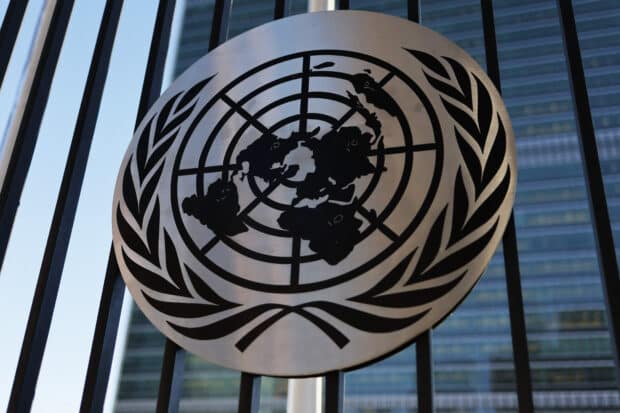


 FILE PHOTO: The United Nations logo is seen on a fence at the United Nations headquarters on December 12, 2023, in New York City. UN member states on Thursday, August 8, 2024, approved a treaty targeting cybercrime, the body’s first such text, despite fierce opposition from human rights activists who have warned of potential surveillance dangers. Michael M. Santiago/Getty Images/Agence France-Presse
FILE PHOTO: The United Nations logo is seen on a fence at the United Nations headquarters on December 12, 2023, in New York City. UN member states on Thursday, August 8, 2024, approved a treaty targeting cybercrime, the body’s first such text, despite fierce opposition from human rights activists who have warned of potential surveillance dangers. Michael M. Santiago/Getty Images/Agence France-Presse
UNITED NATIONS, United States — UN member states on Thursday approved a treaty targeting cybercrime, the body’s first such text, despite fierce opposition from human rights activists who have warned of potential surveillance dangers.
After three years of negotiations and a final two-week session in New York, members approved the United Nations Convention Against Cybercrime by consensus, and it will now be submitted to the General Assembly for formal adoption.
“I consider the documents… adopted. Thank you very much, bravo to all!” Algerian diplomat Faouzia Boumaiza Mebarki, chairwoman of the treaty drafting committee, said to applause.
Article continues after this advertisementThe committee was set up, despite US and European opposition, following an initial move in 2017 by Russia.
FEATURED STORIES TECHNOLOGY vivo launches V40 Lite with 5000mAh battery covered by 50-month warranty, starts at Php 13,999 TECHNOLOGY Galaxy Buds3 Pro: Delivering tailored sound wherever you go TECHNOLOGY Very mindful, very intuitive: ASUS’ most superior AI PC yet, the Zenbook S 14, empowers you to achieve moreThe new treaty would enter into force once it has been ratified by 40 member nations and aims to “prevent and combat cybercrime more efficiently and effectively,” notably regarding child sexual abuse imagery and money laundering.
Hailing a “landmark convention,” South Africa’s delegate said “the provisions of technical assistance and capacity building offer much needed support to countries with less developed cyber infrastructures.”
Article continues after this advertisementREAD: Chief Justice calls for expansive legal measures vs cybercrimes
Article continues after this advertisementBut the treaty’s detractors – an unusual alliance of human rights activists and big tech companies – denounce it as being far too broad in scope, claiming it could amount to a global “surveillance” treaty and be used for repression.
Article continues after this advertisementIn particular, the text provides that a state may, in order to investigate any crime punishable by a minimum of four years’ imprisonment under its domestic law, ask the authorities of another nation for any electronic evidence linked to the crime, and also request data from internet service providers.
Warning of an “unprecedented multilateral tool for surveillance,” Deborah Brown of Human Rights Watch told Agence France-Presse the treaty “will be a disaster for human rights and is a dark moment for the UN.”
Article continues after this advertisement“This treaty is effectively a legal instrument of repression,” she said. “It can be used to crack down on journalists, activists, LGBT people, free thinkers, and others across borders.”
UN cybercrime treaty’s human rights clauseNick Ashton-Hart heads the Cybersecurity Tech Accord delegation to the treaty talks, representing more than 100 technology companies, including Microsoft and Meta.
“Regretably,” he said Thursday, the committee “adopted a convention without addressing many of the major flaws identified by civil society, the private sector, or even the UN’s own human rights body.”
“Wherever it is implemented, the Convention will be harmful to the digital environment generally and human rights in particular,” he told Agence France-Presse, calling for nations not to sign or implement it.
Some nations, howeverclub asia, are complaining the treaty actually includes too many human rights safeguards.
READ: The fight vs online sexual abuse of children
A few days ago, Russia, which has historically supported the drafting process, complained the treaty had become “oversaturated with human rights safeguards,” while accusing countries of pursuing “narrow self-serving goals under the banner of democratic values.”
During Thursday’s session, Iran attempted to have several clauses with “inherent flaws” deleted.
One paragraph in question stipulated that “nothing in this Convention shall be interpreted as permitting suppression of human rights or fundamental freedoms,” such as “freedoms of expression, conscience, opinion, religion or belief.”
The deletion request was rejected with 102 votes against, 23 in favor (including Russia, India, Sudan, Venezuela, Syria, North Korea, and Libya) and 26 abstentions.
Subscribe to our daily newsletter
Neither Iran nor any other country, however, chose to prevent approval by consensus.
TOPICS: Child Abuse, Cybercrime, online abuse, United Nations READ NEXT 17 Chinese nationals seek plea bargain deal in cybercrime case Phone tracking: Stop being monitored with these steps EDITORS' PICK Heart Evangelista: Woman to woman, I never had a problem with Pia Wurtzbach Marcos: PCG 'never alone' in mission to protect PH Espenido retracts drug-related allegations vs De Lima QC Mayor Belmonte highlights social services in State of City Address DILG identifies 38 hotspots ahead of 2025 polls Party-list system: What to know ahead of 2025 polls MOST READ SC issues TRO vs Comelec resolution on dismissed public officials Tropical Storm Kristine slightly intensifies; Signal No. 2 in 5 areas Walang Pasok: Class suspensions on Wednesday, Oct. 23 LIVE UPDATES: Tropical Storm Kristine View comments